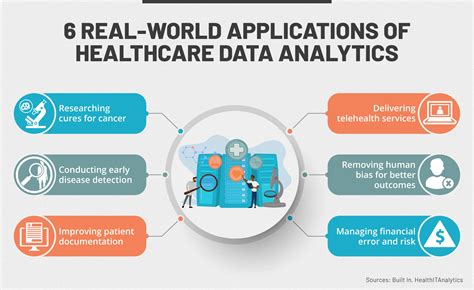The healthcare industry has undergone significant transformations in recent years, and one of the key drivers of this change is the increasing use of big data applications. The integration of big data analytics has revolutionized the way healthcare providers, researchers, and policymakers approach patient care, disease diagnosis, and treatment outcomes.
The importance of big data in healthcare cannot be overstated. With the vast amounts of data being generated every day, healthcare professionals can now tap into this wealth of information to gain valuable insights into patient behavior, treatment outcomes, and disease patterns. This, in turn, enables them to make more informed decisions, improve patient care, and reduce healthcare costs.

Benefits of Big Data Applications in Healthcare
The benefits of big data applications in healthcare are numerous and varied. Some of the most significant advantages include:
- Improved patient outcomes: By analyzing large datasets, healthcare providers can identify patterns and trends that can inform treatment decisions and improve patient outcomes.
- Enhanced disease diagnosis: Big data analytics can help researchers identify new biomarkers and diagnostic tests, enabling earlier and more accurate disease diagnosis.
- Personalized medicine: With big data analytics, healthcare providers can tailor treatment plans to individual patients based on their unique genetic profiles, medical histories, and lifestyle factors.
- Reduced healthcare costs: By identifying areas of inefficiency and waste, healthcare providers can reduce costs and improve resource allocation.
Applications of Big Data in Healthcare
Big data applications in healthcare are diverse and far-reaching. Some of the most significant applications include:

- Electronic health records (EHRs): EHRs are a fundamental application of big data in healthcare, enabling healthcare providers to store, manage, and analyze large amounts of patient data.
- Predictive analytics: Predictive analytics involves using statistical models and machine learning algorithms to analyze large datasets and predict patient outcomes, disease diagnosis, and treatment responses.
- Genomics and precision medicine: Big data analytics is playing an increasingly important role in genomics and precision medicine, enabling researchers to analyze large amounts of genomic data and identify new biomarkers and therapeutic targets.
- Telemedicine and remote monitoring: Telemedicine and remote monitoring are significant applications of big data in healthcare, enabling healthcare providers to remotely monitor patients and deliver care in real-time.
Challenges and Limitations of Big Data Applications in Healthcare
Despite the numerous benefits and applications of big data in healthcare, there are several challenges and limitations that must be addressed. Some of the most significant challenges include:
- Data quality and integration: Big data analytics requires high-quality and well-integrated data, which can be a challenge in healthcare where data is often fragmented and siloed.
- Data security and privacy: Big data analytics raises significant concerns about data security and privacy, particularly in healthcare where sensitive patient data is involved.
- Interoperability and standardization: Big data analytics requires interoperability and standardization across different healthcare systems and platforms, which can be a challenge in healthcare where systems are often incompatible.

Future Directions for Big Data Applications in Healthcare
The future of big data applications in healthcare is exciting and rapidly evolving. Some of the most significant future directions include:
- Artificial intelligence (AI) and machine learning: AI and machine learning are expected to play an increasingly important role in big data analytics in healthcare, enabling healthcare providers to analyze large amounts of data and make more informed decisions.
- Internet of Things (IoT) and wearables: IoT and wearables are expected to generate vast amounts of data in healthcare, enabling healthcare providers to remotely monitor patients and deliver care in real-time.
- Precision medicine and genomics: Precision medicine and genomics are expected to continue to play an increasingly important role in big data analytics in healthcare, enabling researchers to analyze large amounts of genomic data and identify new biomarkers and therapeutic targets.
Conclusion
Big data applications in healthcare are revolutionizing the way healthcare providers, researchers, and policymakers approach patient care, disease diagnosis, and treatment outcomes. While there are several challenges and limitations that must be addressed, the benefits and applications of big data in healthcare are numerous and varied. As the field continues to evolve, we can expect to see significant advances in AI, IoT, and precision medicine, enabling healthcare providers to deliver more personalized, effective, and efficient care.





What is big data in healthcare?
+Big data in healthcare refers to the large amounts of data generated by healthcare providers, researchers, and patients, which can be analyzed to gain insights into patient care, disease diagnosis, and treatment outcomes.
What are some of the applications of big data in healthcare?
+Some of the applications of big data in healthcare include electronic health records, predictive analytics, genomics and precision medicine, and telemedicine and remote monitoring.
What are some of the challenges of big data in healthcare?
+Some of the challenges of big data in healthcare include data quality and integration, data security and privacy, and interoperability and standardization.
